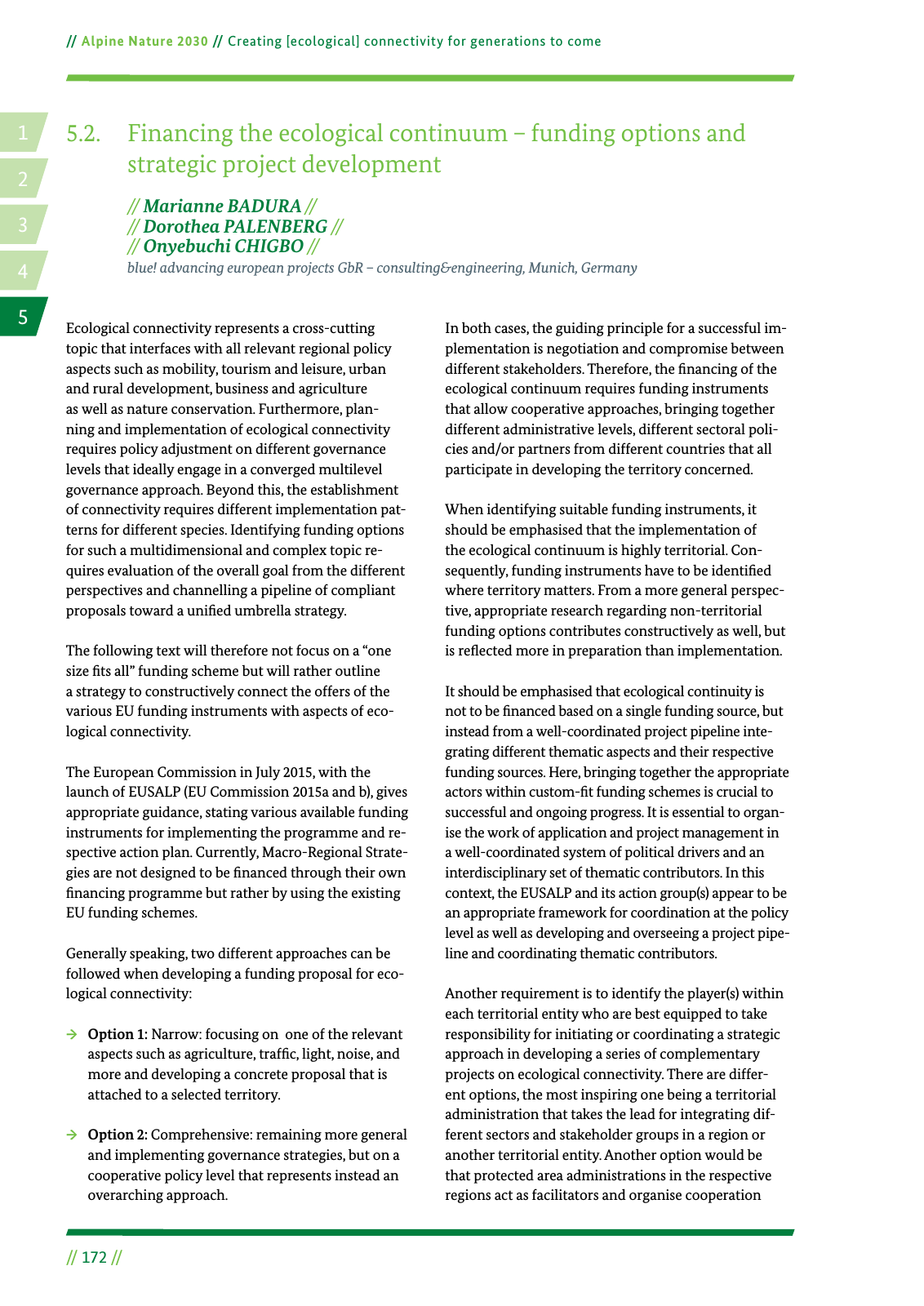14 2 5 3 Alpine Nature 2030 Creating ecological connectivity for generations to come 172 Ecological connectivity represents a cross cutting topic that interfaces with all relevant regional policy aspects such as mobility tourism and leisure urban and rural development business and agriculture as well as nature conservation Furthermore plan ning and implementation of ecological connectivity requires policy adjustment on different governance levels that ideally engage in a converged multilevel governance approach Beyond this the establishment of connectivity requires different implementation pat terns for different species Identifying funding options for such a multidimensional and complex topic re quires evaluation of the overall goal from the different perspectives and channelling a pipeline of compliant proposals toward a uni ed umbrella strategy The following text will therefore not focus on a one size ts all funding scheme but will rather outline a strategy to constructively connect the offers of the various EU funding instruments with aspects of eco logical connectivity The European Commission in July 2015 with the launch of EUSALP EU Commission 2015a and b gives appropriate guidance stating various available funding instruments for implementing the programme and re spective action plan Currently Macro Regional Strate gies are not designed to be nanced through their own nancing programme but rather by using the existing EU funding schemes Generally speaking two different approaches can be followed when developing a funding proposal for eco logical connectivity Option 1 Narrow focusing on one of the relevant aspects such as agriculture traf c light noise and more and developing a concrete proposal that is attached to a selected territory Option 2 Comprehensive remaining more general and implementing governance strategies but on a cooperative policy level that represents instead an overarching approach 5 2 Financing the ecological continuum funding options and strategic project development In both cases the guiding principle for a successful im plementation is negotiation and compromise between different stakeholders Therefore the nancing of the ecological continuum requires funding instruments that allow cooperative approaches bringing together different administrative levels different sectoral poli cies and or partners from different countries that all participate in developing the territory concerned When identifying suitable funding instruments it should be emphasised that the implementation of the ecological continuum is highly territorial Con sequently funding instruments have to be identi ed where territory matters From a more general perspec tive appropriate research regarding non territorial funding options contributes constructively as well but is re ected more in preparation than implementation It should be emphasised that ecological continuity is not to be nanced based on a single funding source but instead from a well coordinated project pipeline inte grating different thematic aspects and their respective funding sources Here bringing together the appropriate actors within custom t funding schemes is crucial to successful and ongoing progress It is essential to organ ise the work of application and project management in a well coordinated system of political drivers and an interdisciplinary set of thematic contributors In this context the EUSALP and its action group s appear to be an appropriate framework for coordination at the policy level as well as developing and overseeing a project pipe line and coordinating thematic contributors Another requirement is to identify the player s within each territorial entity who are best equipped to take responsibility for initiating or coordinating a strategic approach in developing a series of complementary projects on ecological connectivity There are differ ent options the most inspiring one being a territorial administration that takes the lead for integrating dif ferent sectors and stakeholder groups in a region or another territorial entity Another option would be that protected area administrations in the respective regions act as facilitators and organise cooperation Marianne BADURA Dorothea PALENBERG Onyebuchi CHIGBO blue advancing european projects GbR consulting engineering Munich Germany

Hinweis: Dies ist eine maschinenlesbare No-Flash Ansicht.
Klicken Sie hier um zur Online-Version zu gelangen.
Klicken Sie hier um zur Online-Version zu gelangen.